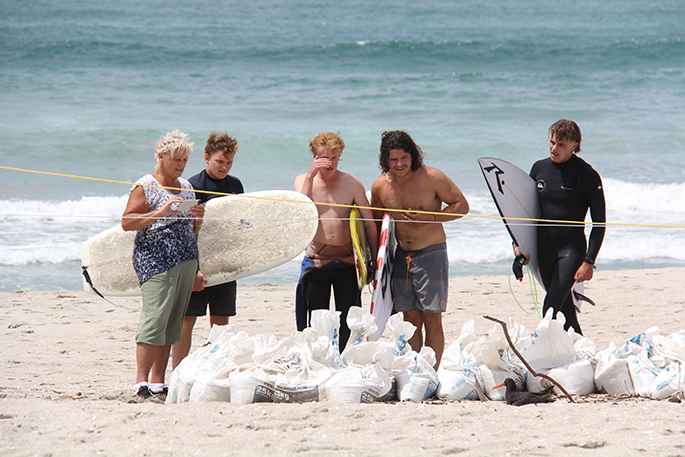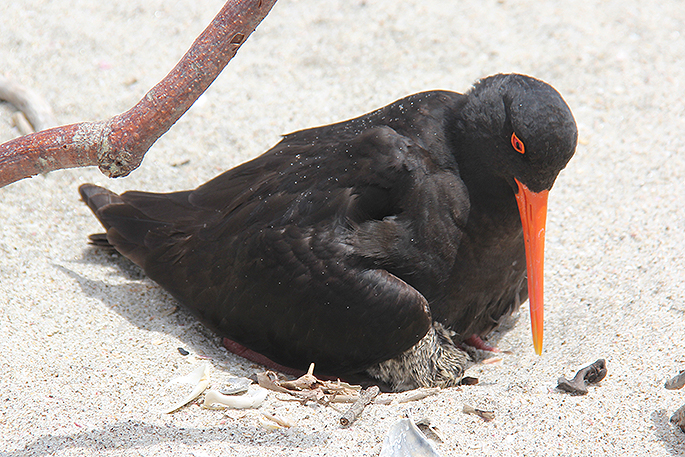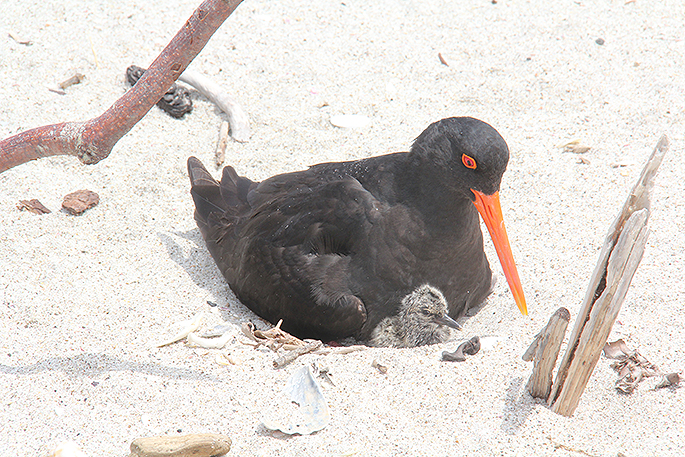The first of two oystercatcher eggs hatched on the Mount Main Beach today.
Popping its head out from under mum's feathers, the little chick looked bright-eyed and very ready to meet the world.
On this, day one, it was facing a firm northerly breeze with gusts whipping sand along the beach. Only six weeks to go and it would be flying across this same shoreline.
The pair of oystercatchers nesting at the Mount, known as Harry and Sophie, made it safely through New Year's Eve celebrations despite high concerns that their nest and eggs could be trampled on by revellers.
The eggs, laid in a scrape in the sand before Christmas, were roped off by the Department of Conservation and a public sign erected.
Volunteers from the local Western Bay Wildlife Trust placed sandbags around the oystercatcher nest to help protect it from high tides.
The pair took turns sitting on the eggs, keeping them cool out of the hot sun, and keeping them warm at night.
 Cate Duff, Harri Wade, Jeremy Holland, Tom McGregor and Henry Penny check out Harry and Sophie's new chicks.
Cate Duff, Harri Wade, Jeremy Holland, Tom McGregor and Henry Penny check out Harry and Sophie's new chicks.
Variable oystercatchers breed in monogamous pairs, and defend territories vigorously against neighbours. Nests are normally simple scrapes in the sand, often with a marker of driftwood, vegetation, or flotsam.
Western Bay Wildlife Trust's Julia Graham says it's important people respect the area and keep their distance.
'Everyone needs to remember why it is so important to have and respect the few dog free zones that exist in the area.
'Also please respect and keep your distance from the nesting birds."
The two or three eggs are usually laid from October onwards. Incubation is shared and takes about 28 days.
Chicks fly at six to seven-weeks-old, and late chicks may not fledge until March.
Visited daily by holidaymakers and locals, Harry and Sophie's nest has been a high interest point for cruise ship passengers and other visitors to the Mount.
So here's to you Tauranga and Mount Maunganui – feel proud of the fact that we successfully witnessed the safe arrival of new born chicks in the middle of the busiest holiday period smack in the middle of one of the most popular beaches in New Zealand. Well done!
Only, now, the real worry starts, as the little chicks start to explore their habitat. They are well-camouflaged, being the same colour as the sand and rocks around them.
"Even though it is a dog free zone," says Julia Graham. "Every day people are seen with dogs in that area. The dogs and domestic cats may ignore the eggs but the little babies cannot fly or run away so they are at real risk of getting eaten.
"Lots of times kids have been seen chasing around the adults, so the chicks are also at risk of being trampled by them, or even being run over by the sand groomer.
"That's why it's really important to heed the dog free zones. They are not there just to be annoying and discriminate against dog owners. They exist for many reasons - to protect native wildlife, so surf lifeguards can focus their attention on the job they need to do without dogs getting in the way, and so families can enjoy the beach."




2 comments
Dog Free yeah right!
Posted on 04-01-2017 07:00 | By Johnney
It would be dog free if council ever bothered to police it. These bylaws are a waste of time.
Late again!!!....
Posted on 04-01-2017 08:40 | By Jimmy Ehu
what am I to have with my bacon for " brekkie" now?.
Leave a Comment
You must be logged in to make a comment.